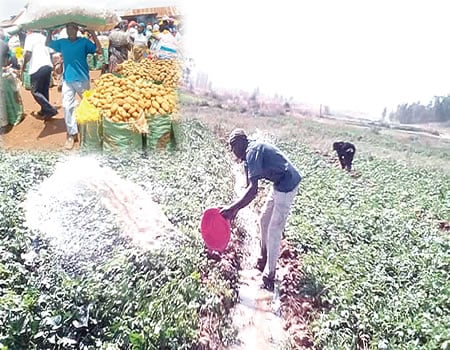PLATEAU State is the hub of Irish potato production in Nigeria. It also produces the best species of the cash crop among other states that have capacities to produce. This gives credence to why traders from across the country throng the state to buy the cash crop. Statistic show that the state has a yearly output of over 500,000 metric tonnes of potatoes from farms across the state, especially in Jos North, Bassa, Bokkos and Barakin-Ladi, Mangu and Pankshin local government areas. In Mangu potato market alone, no fewer than 200 trucks of Irish potato throng the market every week for business, while the story is the same in Bokkos and other local government areas where this cash crop is cultivated.
Unfortunately, in spite of the volume of business transaction involving the commodity, successive governments in the state did not see it as a veritable comparative advantage to boost its financial base and to create employment. Despite its huge economic potential and market size, the farmers remain poor and frustrated due to lack of storage facilities, owing to loss of a huge chunk of the crop at the peak of the harvest period.
Though the administration of the former Governor Jonah Jang attempted to boost agriculture in the state by establishing agricultural training centres in the state’s three senatorial districts in partnership with an Israeli firm, the mode of operation of the training centres failed the farmers.
However, like a dream come true, succour came the way of the farmers recently, when the federal government announced that it has secured a N3.38 billion loan from the African Development Bank (AfDB) to support mass production of Irish potatoes and development of value chain in Plateau State.
Minister of Finance, Mrs. Kemi Adeosun, who disclosed this recently shortly after one of the weekly Federal Executive Council (FEC) meetings in Abuja, recently, said the loan has a 25 years repayment plan with moratorium of five years at the rate of one per cent, adding that Plateau State government would provide N595 million as counterpart funding for the project which targets the creation of 60,000 jobs.
According to her, the loan would be used to develop the Irish potato value chain in the 17 local government areas of the state and that it would be jointly executed by FADAMA project and a unit in the state’s ministry of agriculture, adding that about 70 per cent of the loan would be used for the provision of infrastructure, extension services, improved planting and marketing in order to boost production and minimize wastage.
“The rationale is that Plateau actually accounts for 95 per cent of Nigeria’s potato production and from Plateau, potatoes are actually exported to Ghana, Niger, Chad and other countries and despite that, there are huge profit losses because there is no enough storage and there is so much more we can do with Plateau’s potatoes.
“So, AfDB has come up with a comprehensive programme that will affect over 100,000 families. It is expected to create 60,000 jobs in a potato value chain, from processing, storage, replacement of current inputs and indeed, export.
“We have real advantage in potato production. We are really going to invest the money on roads. In some cases, the money will be used for roads to enable the products to come out. Sometimes, it is for storage. Sometimes, it is transportation. Sometimes, it is access to seedlings.” Adeosun had explained.
When the news of the loan filtered into the state, famers and the entire people of the state were apprehensive. While some of farmers and traders who spoke with Sunday Tribune saw it as a welcome development that would address the long-term challenges facing them,others weren’t so excited.
Ibrahim Musa, a farmer who could not hide his excitement over the development, commended the federal government, but was unhappy about Plateau State government’s posture towards agriculture, saying it, is not encouraging. According to him, the huge economic potential of potato is capable of turning around the fortune of the state, but that the losses often recorded annually due to lack of storage facilities, coupled with bad road network, is colossal and discouraging.
“With this intervention, we expected to see transformation and meaningful change,” Musa told Sunday Tribune.
In Barakin-Ladi and Bassa Local Government Areas of the state, most of the farmers are women and young girls. Those who spoke with SundayTribune said they had received the news through their associations and were waiting for the implementation.
Tabitha Gwom, a farmer in Bassa Local Government implored the government to use the loan for what it is meant for and avoid the temptation of diverting it to another source.
At the potato market in Jos South local Government traders are not too enthusiastic about the loan. One of officials of the Potatoes Traders Association, Anthony Dalyop, simply took a let’s-wait-and-see posture.
“We are waiting for the implementation. We just hope it is not one of those political gimmicks and statements,” he told Sunday Tribune, adding that if the loan was properly implemented, it will cause a turn-around. He, however, warned against diversion, noting that many traders and farmers are not too excited about the loan because of previous experiences.
“We farmer are watching, but I must tell you we are too keen (to see the outcome) based on previous experience but hope there will be difference this time,” he said.
Perhaps a down-side to a possible potato revolution is a recent breakout of a disease called potato blight which ravaged many potato farms in the state. Daniel Manchang, a potato farmer said the outbreak of the disease will no doubt affect this year’s production output, but expressed hope that when the loan is eventually disbursed and utilised for what it was meant for, it would address such a problem in the future.
The threats within
Some of the stakeholders have implored the state government on the need to provide an enabling environment for the project to be successful. One of the areas they quickly pointed out is the issue of security, though there is now a respite.
They are of the opinion that the state government needs to build on the prevailing peaceful atmosphere, more so that the local governments reputed for huge production of the cash crop have been theatres of conflict in the internecine ethno-religious war in the state.
Recently, it was alleged that Fulani herdsmen took over potato farm settlements in Mahurum in Bokkos Local Government Area of the state, an epicentre of herdsmen and farmers clashes noted for potato production and allegedly evicted the natives.
A potato farmer in Bokkos, John Ibrahim, also harped on the issue of peace saying the state government must take precautionary step to further consolidate on the current peace in the state.
Mr. Friday Derwan, a farmer from Mangu Local Government Area noted that peace is needed for the success of the project.
“For the sake of the programme there is a need for synergy between all the security agencies to further promote peace. There are farmers in these farming communities that have been displaced as a result of crises, these farmers need to be encouraged and assured of adequate security to return to their bases,” he stated.
Mallam Mohammad Nuru, the Plateau State Chairman of Meyyati Allah Cattle Breeders Association, believes that t the project is alive and would be successful once both farmers and herders are united to make it work through peaceful co-existence.
“We are happy now that there is peace on the Plateau; we are working towards permanent peace, the present peace is being managed by the farming community and the cattle breeding community. The problem of blocking grazing route by farmers may lead to cattle destroying farm produce and destroy the programme. If the farmers and cattle breeders will manage their farms and cattle properly, the programme will succeed.
“We have started sensitising our people to the need to further strengthen existing peace. We organised the cattlemen into clusters and appoint leaders among them; the leadership will be monitoring the teams for us to ensure that they conduct themselves lawfully because there are law guiding grazing and other activities of the herders.
“We are also taking measures to control migration from one point to another,” Mallam Nuru explained.
He is, however, of the opinion that the so-called farmers/herders clashes were actually the handiwork of criminals across the divide, adding that the next phase of the sensitisation would be to identify the criminals in the affected communities.
“We can collaborate with security agencies to fish them out and deal with them decisively. If the security men arrest any criminal, we will ensure that he is brought to book, be he a Fulani man or Berom man, but we may find it difficult with the Berom around us.
“This is because if I lead a policeman to arrest a Berom man, they may think I am witch-hunting him. But we want to start with examples from our community, we want to fish out our own, deal with them and show the world that this is what we are doing. The Berom too should be able to do similar thing,” Mallam Nuru stated.
However, the state government has allayed the fears of farmers, promising that the loan will be fully utilised to uplift agriculture in the state, especially production of Irish potatoes.
Senior Special Assistant to the governor on Media, Mr. Mark Longyen, said counterpart fund would be released at the appropriate time, adding that the government knows the importance of the fund.
“It is wrong for anybody to assume that the loan will go the way of ecological fund. This government strongly believes in transparency and accountability. This government is meticulous. Therefore, nobody should entertain any fear. The fear of mismanagement should be discarded. Agriculture is the main drive of the economy; it is considered paramount in the quest for development of our state,» Longyen explained to Sunday Tribune, giving assurance to farmers in the state that nthing untoward would happen to the loan and that it would be judiciously spent.






